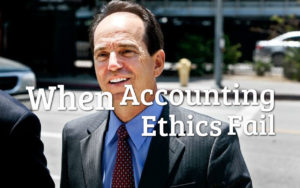Would you voluntarily do something that would end your career and change your life forever? Most people, when I ask that question in my seminars, say resoundingly – NO! Yet, everyday people make choices that have that very consequence. Former CPA and my friend Scott London is no different. When accounting ethics fail the outcome is most likely life altering. My career  as a CPA was shattered by my choices and so was Scotts. Every choice has a consequence!
as a CPA was shattered by my choices and so was Scotts. Every choice has a consequence!
When accounting ethics fail – ethics are cast by the wayside. Every year there is a story about a prominent individual who has done the unexpected and committed some ethical sin. Most of these stories have one common thread: a desire to meet a need for a life out of balance. Those that don’t are usually fueled by sheer stupidity. Wall Street brokers, accountants and other financial services professionals have millions of dollars pass through their hands on a daily basis. The temptation to make some of that money their own is common. But that’s not always the motive. Scott London, former audit partner at KPMG, is a classic example of an individual who succumbed to this temptation, but not really for the money. To understand why accounting ethics fail one has to look to the underlying reasons and sometimes they are not clear on the surface.
Scott London was a prominent accounting professional who gradually made his way to the top of the corporate ladder. He had access to key insider trading tips that helped him tip the trading scales in favor of a close friend. His accounting ethics were cast aside in favor of huge financial rewards for one of his friends. But it didn’t start large nor did it start with the idea that accounting ethics would fail. London shared these valuable trading secrets with Bryan Shaw, a prominent jeweler and close friend when Shaw was facing a financial crisis in the Great Recession that we most recently completed. Shaw used these tips to guide his trading and eventually reaped great rewards. What did Scott London received in return – not much!
London claims that he only incriminated himself to assist his friend. Some find it is hard to believe that he wasn’t somewhat motivated by the financial gain. Nevertheless, the financial rewards amounted to $50,000 and a Rolex watch. London openly accepted his error, confessed, and served a 12 month prison sentence from July 18, 2014 to July 25, 2015.
When accounting ethics fail, as London can attest, the consequences can be life changing. He was penitent and has since been an inspiration to others to prevent the same thing from happening to them. Scott London’s story provides great insight into how easy it is to neglect ethical principles. His experience can teach other CPAs and business professionals how to keep ethics at the forefront. The insights I have gained from his story are outlined below.
Insight #1: Stay True to What You Stand For
London was persuaded by the persistent efforts of his friend. He knew that what he was doing was wrong, but he still did it anyways. Standing for your ethical beliefs may make you unpopular. However, the long-term consequences of going against these beliefs can prove to be detrimental to your future. After prisons Scott London was able to secure a job as assistant to the chief financial officer of a computer company based in Los Angeles. This job is a far cry from being a partner at KPMG. His promising future as a leading executive at the most prominent accounting firm in the United States was brought to a rapid stand still.
Insight #2: Some Friends are Bad Influences
Anyone who influences you to do something unethical isn’t a true friend. A friend who can’t see the error of his or her ways doesn’t deserve to be in your life. If Scott London had accepted this from the onset and dropped Bryan Shaw as a friend, he would probably still be thriving in his partnership at KPMG. Not only did Bryan Shaw use Scott London for information – information that he knew was illegal, but Shaw became an informant turning on the very man who helped him with information. Shaw turned London over to the FBI.
Insight #3: Your Client’s Trust Overrides Everything Else
Business can easily be destroyed by a marred reputation. If Scott London hadn’t admitted that KPMG had no knowledge of his insider trading, the company could have suffered terrible losses. Your clients should be able to trust you implicitly, especially if you are dealing with their financials. Staying true to your ethical principles will help you win and maintain your clients’ trust. London’s actions not only cost him his license as a CPA, but also cost KPMG their clients (those that London betrayed through this revelation of insider information).
Insight #4: Never Get Complacent
When asked why he did what he did, London stated that he has no real answer. However, he feels that being in the same position for so long at KPMG and wanting to help his friend were probably the strongest motivational factors. This statement makes it clear that constantly improving yourself and seeking opportunities is crucial regardless of your position in life. Goal setting and attainment should be a constant part of your life. Yes, you’ve gotten to the top, but the question you should ask yourself is “What next?”
Don’t be influenced by those who want to compromise your ethics. Stay true to your ethical principles and your commitment to help your business succeed. Learn from Scott London’s and most certainly my mistake. When accounting ethics fail the outcomes is never good.
YOUR COMMENTS ARE WELCOME!

